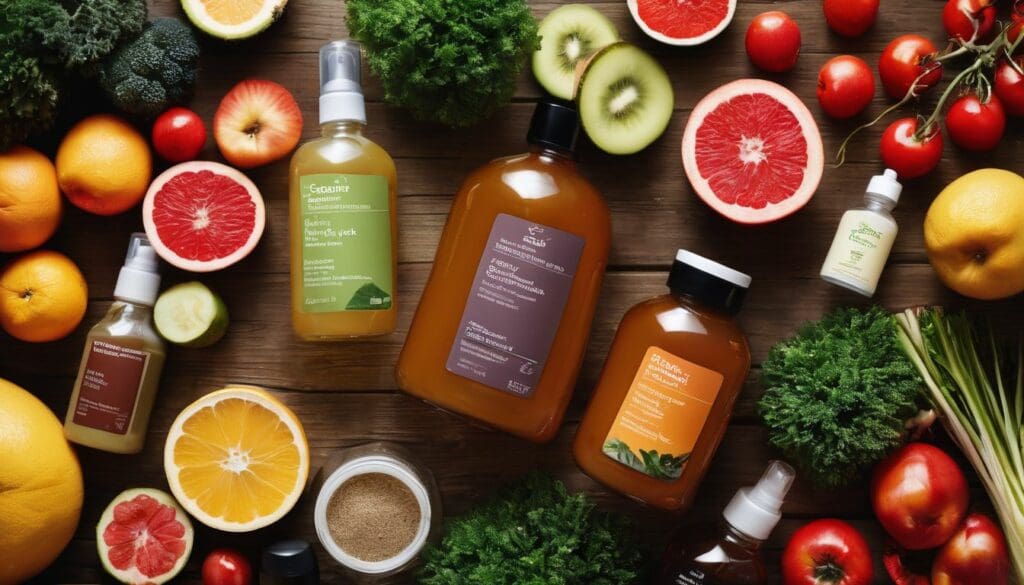Struggling with dull, lifeless hair can be a daily frustration. Surprisingly, your hair’s health reflects what you feed it both inside and out. This article will guide you through natural care practices and nutritional tips to revitalise your mane from the roots up.
Let’s unlock the secrets to luscious locks!
Key Takeaways
- Eat a balanced diet with plenty of proteins, omega – 3s, zinc, and antioxidants to fuel hair growth and protect it from damage.
- Opt for natural hair care products such as sulphate-free shampoos and conditioners to avoid stripping your hair’s oils and damaging the environment.
- Regularly use deep conditioning treatments like hair masks with natural ingredients to nourish and strengthen your locks.
- Protect your hair from heat by using protectant sprays before styling and minimise chemical processes to keep it healthy.
- Maintain scalp health through regular cleansing, exfoliating, moisturising with oils, and protecting it from sun exposure.
Why Natural Care and Nutrition are Important for Healthy Hair
Moving beyond the basics of hair care, considering natural remedies and nutrition lays a foundation for truly healthy hair. Your hair reflects what you put into your body as much as how you treat it on the outside.
Chemical products can strip hair of its natural oils, leaving it dry and brittle over time. Natural alternatives, rich in vitamins and minerals essential for hair nourishment, tend to be gentler on both your locks and the environment.
Eating a balanced diet fuels follicles with the right nutrients to grow strong, vibrant strands. Think proteins for strength; omega-3s found in nuts and seeds for shine; zinc from whole grains to prevent shedding; and antioxidants from berries to protect against damage.
This holistic approach combines environmental consciousness with impeccable hair maintenance – an ideal synergy that promotes sustainability while ensuring luscious tresses thrive.
Tips for a Healthy Diet for Stronger, Fuller Hair
Incorporate protein-rich foods, such as lean meats, eggs, and legumes, into your diet to promote healthy hair growth. Additionally, eating plenty of fruits and vegetables will provide essential vitamins and minerals that are crucial for maintaining strong and full hair.
Incorporate protein-rich foods
Include protein-rich foods in your diet to promote healthy hair growth and strength. Foods such as lean meats, fish, eggs, dairy products, legumes, nuts and seeds are excellent sources of protein that can help maintain the health and vitality of your hair.
Protein is essential for building and repairing tissues in the body, including the hair follicles. Additionally, incorporating protein into your diet will also contribute to overall scalp health.
Ensuring an adequate intake of protein-rich foods supports healthy hair growth and maintenance. This dietary approach combined with a natural care routine will lead to shiny, strong locks that are less prone to damage.
Eat plenty of fruits and vegetables
Incorporate protein-rich foods to help keep your hair strong and healthy. Incorporating a variety of fruits and vegetables into your diet provides essential vitamins and nutrients, promoting overall hair wellness.
Fruits such as berries, oranges, and apples are rich in antioxidants that help maintain scalp health. Leafy greens like spinach and kale are packed with iron, essential for circulation to the scalp.
Including a rainbow of fruits and vegetables ensures you’re getting a wide range of nutrients crucial for luscious locks.
Avoid smoking and excessive alcohol consumption
To maintain healthy hair, it is important to avoid smoking and excessive alcohol consumption. These habits can have a negative impact on the overall health of your hair. Smoking restricts blood flow to the scalp, which in turn can impede the growth of healthy hair follicles.
Excessive alcohol consumption can dehydrate your body, leading to dry and brittle hair. Additionally, both habits contribute to an unhealthy scalp environment, which can lead to dandruff and other scalp issues.
By avoiding smoking and excessive alcohol consumption, you are not only prioritising your overall health but also supporting the natural vitality of your hair.
How to Properly Cleanse and Condition Your Hair
Use sulphate-free shampoo, apply conditioner properly, and use a hair mask weekly for added nourishment. For more tips on maintaining healthy hair, keep reading!
Use sulphate-free shampoo
Choose sulphate-free shampoo to gently cleanse your hair without stripping away natural oils. Protecting the environment and supporting sustainability can start right in your shower.
Sulphate-free shampoos are gentle on both your scalp and the environment, as they don’t contain harsh chemicals that may harm aquatic life when washed down the drain. Embrace a more natural approach to hair care with environmentally-friendly products that promote healthy, beautiful locks while also making a positive impact on our planet.
When washing your hair, selecting sulphate-free options not only benefits you but also reduces harmful chemical exposure for both humans and wildlife.
Apply conditioner properly
After shampooing your hair with a sulphate-free product, the next step to maintain healthy and shiny locks is to apply conditioner properly. Take a small amount of conditioner in your palm, rubbing it between your hands before applying evenly from mid-length to the ends of your hair.
Gently comb through with a wide-toothed comb, leave for a few minutes, then rinse thoroughly. This ensures that the conditioner penetrates each strand, providing essential moisture and protection.
To boost the conditioning effect further, consider using a deep conditioning treatment once weekly or as needed. These treatments can provide extra nourishment and repair damaged or dry hair.
Use a hair mask weekly or as needed
To maintain healthy and nourished hair, incorporate a hair mask into your routine on a weekly basis or as needed. Hair masks provide deep conditioning to help repair damage, restore moisture, and strengthen the hair.
Look for natural ingredients such as coconut oil, shea butter, or argan oil to provide essential nutrients that promote shiny and smooth locks. Applying a hair mask regularly can also protect against environmental stressors and keep your scalp healthy.
Pamper your hair with a homemade avocado or banana-based mask alongside commercially available options for an eco-friendly home care regimen. Integrate this simple step into your routine to support sustainable practices while maintaining luscious locks effortlessly.
Protecting Your Hair from Heat and Chemicals
Protecting your hair from heat and chemicals is essential for maintaining its health and vibrancy. Using heat protectant products, minimising hair processing, and protecting your hair from sun and chlorine are all important steps in keeping your locks looking their best.
Use heat protectant products
Protect your hair from heat damage by using heat protectant products before styling with hot tools. These products form a protective barrier against the high temperatures, preventing your hair from becoming brittle and dry.
Applying a heat protectant also helps to maintain moisture, reduce frizz, and prevent split ends, keeping your hair healthy and strong. Additionally, look for natural or eco-friendly heat protectants to support conservation efforts while caring for your hair.
By using heat protectant products before styling with hot tools, you can safeguard your hair from potential damage caused by high temperatures. Look for natural or eco-friendly options to support conservation efforts while maintaining the health of your hair.
Minimise hair processing
To further maintain the health of your hair, it’s essential to minimise hair processing. This involves reducing the use of chemical treatments such as perms, straightening, and excessive dyeing.
Limiting these processes can help prevent damage and breakage while maintaining the natural strength and shine of your hair.
Avoiding excessive heat styling can also minimise hair processing. Embracing more natural hairstyles reduces the need for excessive blow-drying, curling, or straightening with hot tools which can lead to dryness and brittleness over time.
Protect hair from sun and chlorine
Shield your hair from the damaging effects of the sun and chlorine by using a UV-protectant spray before stepping out in the sunlight. This will prevent excessive drying and discoloration, keeping your locks healthy and vibrant.
Additionally, invest in a swimming cap or generously coat your hair with conditioner before taking a dip in chlorinated water to safeguard it from absorbing harmful chemicals.
To further care for your hair, rinse it thoroughly after swimming to remove any lingering chlorine residue. Be proactive about protecting your hair from environmental factors, ensuring its health and vitality all year round.
Extra Care Tips
Proper detangling techniques can prevent breakage and damage to your hair. Brushing and drying your hair gently can also help maintain its health, while taking care of your scalp is essential for healthy hair growth.
Proper detangling techniques
Detangling hair gently reduces breakage and damage. Start by applying a leave-in conditioner or detangling spray. Then, using a wide-tooth comb, start at the ends and work your way up to the roots.
This helps to avoid tugging and pulling on knots while minimising hair loss.
When dealing with stubborn tangles, use your fingers first to loosen them before resorting to a comb. A weekly deep conditioning treatment can also help in keeping hair manageable and minimising tangles.
Brushing and drying hair properly
Properly brushing and drying your hair is crucial for maintaining its health and strength. Use a wide-tooth comb to gently detangle damp hair, starting from the ends and working your way up to prevent breakage.
Opt for air-drying over heat styling whenever possible to minimise damage from excessive heat exposure. When using a hairdryer, keep it at a safe distance from your hair and use the lowest heat setting to protect the strands.
After washing, pat your hair dry with a soft microfibre towel rather than rubbing vigorously, which can lead to frizz and damage. Letting your hair air-dry partially before using any hot tools will reduce the amount of time they need to be in contact with your hair, minimising potential harm.
Taking care of your scalp
To maintain a healthy scalp, it’s important to cleanse and exfoliate regularly. Using a gentle exfoliating scrub or brush can help remove dead skin cells and product buildup. Additionally, massaging the scalp with natural oils like coconut or jojoba oil can promote circulation and keep the scalp moisturised.
Protecting your scalp from sun exposure by wearing a hat or using SPF hair products is also crucial in maintaining its health.
Moreover, keeping stress levels in check can help prevent scalp issues such as dandruff and itchiness. Practising relaxation techniques like meditation or yoga can contribute to overall scalp health.
Conclusion
To maintain healthy hair, adopt a diet rich in protein, fruits, and vegetables. Use sulphate-free shampoo and apply conditioner properly for clean and nourished hair. Protect your hair from heat and chemicals by using heat protectant products and minimising processing.
Finally, remember to incorporate proper detangling techniques, brush and dry your hair gently, as well as take care of your scalp for overall healthy hair maintenance.
FAQs
1. What are some natural hair care tips for keeping my hair healthy?
Incorporate a natural hair care routine that includes gentle cleansing, conditioning with natural oils, and using DIY hair care treatments to keep your hair shiny and strong.
2. How does diet impact the health of my hair?
Eating a balanced diet rich in nutrition for hair, like proteins, vitamins, and minerals will support healthy hair growth and add lustre to your strands.
3. Can I take care of my hair at home instead of going to a salon?
Absolutely! With the right techniques and natural remedies for hair strengthening treatments, you can maintain shiny, strong locks through a consistent DIY home-care regimen.
4. What daily habits contribute to healthier looking locks?
Healthy daily habits include protecting your tresses from harsh elements, minimising heat styling damage by using protection sprays or gels when needed & being gentle while brushing or combing.
5. Are there specific nutrients I should focus on for better hair health?
For optimal condition of your mane, ensure you get plenty of protein along with Vitamins A,C,E & Biotin; these play key roles in fostering robust & radiant locks.





